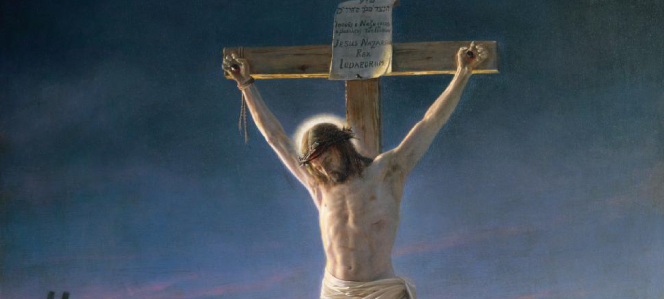St. Thomas contends that a man with no sense of humor is actually deficient, lacking something that ought to be present in a man fully alive. Jesus was perfectly man, so where are his casual smiles, his amused chuckles, and his belly laughs?
Some of the most popular current answers to this question seem to miss the mark, more or less widely. Some scholars apply form criticism to Jesus’ speech as recorded in the Gospels and conclude that he did in fact use comic rhetorical devices like irony, satire, puns, and sarcasm; so even if we don’t see Jesus laughing, we see him using modes of speech designed to strike others as incongruous, and perhaps even funny. Other scholars—and artists like Ralph Kozak—say that the nature of Jesus’ message surely must have led him to smile; one scholar argues that it is impossible to imagine Jesus preaching the Beatitudes without a joyous grin on his face.
A much smaller group, popularly led by religious conspiracy theorists Timothy Freke and Peter Gandy, uses Gnostic texts like The Gospel of Judas to contend that Jesus did, in fact, laugh a great deal, generally as a means of signaling to the enlightened among his followers that the unenlightened had committed a spiritual gaffe through ignorance of his secret wisdom.
The first of these answers fails by excessive ingenuity. Jesus’ use of a panoply of linguistic devices makes him a skilled rhetor, not a comedian; Socrates was also known as a master ironist, but no one would call him a barrel of laughs. The second answer simply dodges the question, using the celebrated “Yes, but” defense: “Yes, the Gospels don’t record Jesus laughing, but I think he should have, so he did.” More importantly, a Jesus who could say “Blessed are you when men hate you, and when they exclude you and revile you” (Lk 6:22) with a grin on his face would seem unserious at best and cracked at worst.
The errors of the Gnostic view are manifest and manifold. Even at the level of the secular discipline of religious history, the Gnostic Jesus’ propensity to laughter is important for its semiotic function, indicating a shift between a public, exoteric register and a secret, esoteric register; the Gnostic Jesus’ laughter says a great deal about the Gnostic communities’ interest in secret knowledge, but very little about the real behavior of Jesus of Nazareth.
So, then, why doesn’t Jesus laugh in the Gospels? Without pretending to give a definitive answer, we might consider a few relevant points. As a general principle, it is important to note that the Gospels are not attempting to provide journalistic, play-by-play accounts of every moment in Jesus’ life; they are records of salvation history, of Jesus’ mission as redeemer of mankind and revelator of the face of God. We also might note that there are plenty of other characteristically human acts that the Gospel does not record Jesus doing: running, jumping, swimming, washing dishes, taking a bath, and on and on. No one feels that the absence of these activities from the Gospel record casts doubt on Jesus’ genuine humanity.
But one might legitimately respond that laughing is not like those other activities; laughter is proper to man and expresses a deep aspect of the human person. In this vein, Aristotle argued that the ability to laugh is inseparable from man’s rationality, which cannot be said for running, jumping, or bathing. So the question remains.
A more satisfying answer seems to lie in the nature of comedy. Comedy is not just a matter of cracking jokes, however elevated or sophisticated they may be. Fundamentally comedy is the dynamic realization of freedom and love, especially as they emerge from slavery or hatred. As the literary critic Louise Cowan puts it:
“Archetypally, the comic action is the psyche moving out of stasis into the rhythm of the life force; culturally, it is the flexibility of the community prevailing over rigid and oppressive custom; psychologically, it is the heart finding its right order, its abundance, in love; and anagogically, it is the soul’s participation, through the komos, the marriage feast, in universal blessedness.”
Viewed in this light, the entire action of Christ in the world is the perfect and final comedy, with the death, resurrection, and ascension of Our Lord as the definitive event that destroys death, slavery, hatred, and abandonment forever, replacing them with redemption, adoption, the law of love, and participation in the divine life.
St. Paul’s quotation of Hosea perfectly expresses the mystery of the Divine Comedy: “O death, where is thy victory? O death, where is thy sting?” (1 Cor 15:55, cf. Hos 13:14). So may we say, “O slavery, where are thy chains? O tragedy, where are thy tears?” They are gone, consumed in the wood of the cross, buried in the tomb, and transformed in the resurrection into the freedom and love of the Son of God.
The Gospel writers did not choose to express the comedy of Christ in chuckles, smiles, or guffaws, just as they did not express the mystery of the Trinity with lengthy disquisitions. The comedy—the laughter—of Jesus is to be found in the victory of the cross, the Tree of Life on which death died, the Tree from which all life springs.
